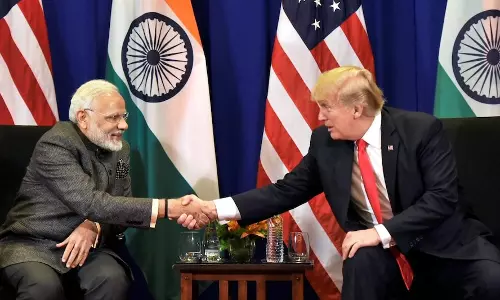Go slow on Aadhaar, let SC take final call
Banerjee has every right to seek constitutional remedy under Article 32 as an individual.;

The Supreme Court may have rapped West Bengal chief minister Mamata Banerjee over her government’s plea challenging the Centre’s move to make Aadhaar compulsory for availing benefits, but the substantive issues remain. It’s just as well the matter will be taken up by a Constitution Bench of five judges as it raises the hope that a definitive ruling may be passed on the issue, over which many are worked up due to overzealous government action. Ms Banerjee has every right to seek constitutional remedy under Article 32 as an individual. It may have been egregious on her lawyers’ part to have filed the plea on behalf of the state government, which distributes social welfare payments. However, the basic issue of making enrollment compulsory when there is no provision in the Aadhaar Act enabling this had to be challenged, so too the privacy concerns of many individuals addressed.
The fundamental premise behind the founding principle of a unique identification system to spot the beneficiaries of social welfare schemes so that subsidies reach only the intended persons is sound. The UIDAI may have helped the Centre weed out fraud and duplication and save thousands of crores of rupees. However, it was executive overreach that lent the Aadhaar card a certain notoriety as the government wanted it linked to bank accounts, mobile phone numbers and several other services, including granting of basic PDS provisions on ration cards, the denial of which even led to starvation deaths in Jharkhand. Whoever made Aadhaar mandatory for every nook and corner of India may not have envisaged the humongous problems of connectivity, system downtime and a slothful petty bureaucracy. At the time the UIDAI concept was born, the technocrats wouldn’t have envisaged what civil servants could do in extending pedantic control over the lives of millions.
The idea of fixing identity on a national scale of about 130 crore people was primarily sound, but the overreach in trying to impose Aadhaar in too many areas and giving telecom companies access to its database has invited needless vulnerabilities. The basic question of whether Aadhaar impinges on individual privacy — a nine-judge Supreme Court bench has held that the right to privacy is a fundamental right — has to be considered before a final pronouncement on this issue. The fear of continuous mass surveillance and profiling of people as an Aadhaar-wielding Big Brother builds massive data of every Indian’s economic situation, work performance, health and personal preferences is real. The Aadhaar law’s constitutional validity must be tested in the highest court, and until a verdict is passed it would be prudent on the executive’s part not to badger people every day to link everything to their Aadhaar, which is only a proof of identity, and not even a guarantor of citizenship.


